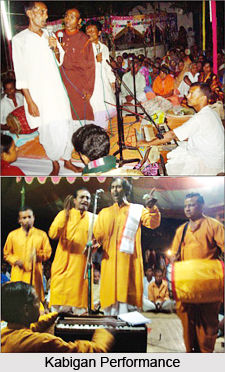 Kabigan is a form of dramatized singing practiced in the rural Bengali theatre. In the earlier days, it used to be very popular in the rural areas. The exact meaning of Kabigaan is light songs in the form of questions and answers between duelling bards.
Kabigan is a form of dramatized singing practiced in the rural Bengali theatre. In the earlier days, it used to be very popular in the rural areas. The exact meaning of Kabigaan is light songs in the form of questions and answers between duelling bards.
Themes of Kabigan
Kabigan`s merit lies in simplicity of content and delivery, and its theatrical distinctiveness in the extempore debates that the singers initiate and develop. This was originally characterized by Vaishnava devotion since its inception in the mid-eighteenth century. Its central themes usually related to Krishna and Radha. More than their love, however, the focus gradually shifted to the elements oikalanka (taint) and chhalana (deception) in the myths.
As the passage of time brought marked changes in social and economic conditions, the patronage of sophisticated zamindars gave way to that of commercial merchants, and the performers succumbed to fun and alliteration for momentary pleasure and entertainment. The Radha and Krishna dialogues evolved and were secularized into Kabi larai i.e. duel involving two troupes of contesting poet-singers and their accompanists. The troupes alternated arguments on a chosen topic of disputation, such as tradition against modernity or capitalism versus communism.
Masters of Kabigan:
There are very few performers who survive in this field. Past masters included Gonjla Guin, Haru Thakur in eighteenth century, Ram Basu, Bhola Mayra, Jajneswari, and the Portuguese-Indian Antonio Cabral all were in nineteenth century. The last-named popularly known as Antony Phiringi i.e. `Antony the Foreigner`, and the subject of Bidhayak Bhattacharya`s Antony kabiyal i.e. `Antony the Poet-duellist` in 1966 and the film Antony Phiringi in 1967.
Popularity of Kabigan:
This singing form is now in decline. Though, sometimes the performance of Kabigan can be enjoyed at some grand literary festival being organised in some villages. Thousands of people flock to the venue to witness the poetic questions and counter-questions with answers.
This article is a stub. You can enrich by adding more information to it. Send your Write Up to content@indianetzone.com




